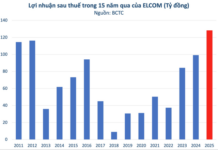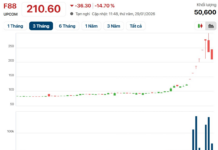The seminar on “Optimizing Operations in the Pharmaceutical Manufacturing and Business” attracted nearly 100 pharmaceutical business leaders. It was organized by the Vietnam Pharmaceutical Companies Association in collaboration with SAP Vietnam and FPT IS.
Vast Opportunities for Vietnamese Pharmaceutical Companies and the Solution: Digital Transformation
Ms. Nguyen Dieu Ha, Secretary-General and Chief of Office of the Vietnam Pharmaceutical Companies Association, stated that the global and Vietnamese pharmaceutical industries face significant challenges due to intense competition and rapid technological advancements.

Ms. Nguyen Dieu Ha, Secretary-General and Chief of Office of the Vietnam Pharmaceutical Companies Association, delivers the opening remarks
“Digital transformation is the key to helping pharmaceutical companies take a more proactive and efficient approach to their business. The adoption of cloud-based management solutions, artificial intelligence, AI, and big data analytics, among other digital technologies, has transformed the way pharmaceutical companies research, develop, and distribute medicines. This enables manufacturing plants to gain a comprehensive view of the production process, optimize human resources and finances, and enhance customer satisfaction,” said Ms. Ha.
Regarding the industry’s growth prospects, Associate Professor Dr. Le Van Truyen, Former Deputy Minister of Health and Former Chairman of the Drug Registration Council of the Ministry of Health, shared that the domestic pharmaceutical industry has performed well over the past decade, achieving a compound annual growth rate of 7.3%. However, challenges remain. The government’s national strategy aims to reduce dependence on imports and focus on modernization to bring Vietnam’s pharmaceutical industry on par with advanced countries.
Associate Professor Dr. Truyen emphasized, “We must dominate the domestic market, and businesses should focus on developing generic drugs, specialized medicines, and vaccines while leveraging Industry 4.0 technologies, cloud computing, and AI to optimize production processes and enhance competitiveness and international integration.”
In reality, many pharmaceutical companies are still unsure about the effectiveness of digital transformation or don’t know where to start. Representatives from Imexpharm and GONSA shared valuable insights and experiences to help address some of the concerns in the industry. Mr. Nguyen An Duy, Deputy General Director of Imexpharm, shared that since 1997, Imexpharm has invested in and achieved the ASEAN GMP standard. In 2012, the company’s management recognized this as an opportunity to restructure and prepare for the next wave of growth, leading to the implementation of the SAP system.
“Digital transformation in management has brought us transparency, enabling us to meet the stringent standards of the European market and providing real-time data for timely decision-making. This has resulted in rapid company growth, the achievement of ESG targets, and cost savings through process standardization,” said Mr. Duy.

Mr. Nguyen An Duy, Deputy General Director of Imexpharm, shares his experience in implementing the SAP S/4HANA system
On the other hand, GONSA, a young and dynamic pharmaceutical company making impressive strides in business and innovation, simultaneously transitioned to five operational software systems in 2023: WMS, ERP, OCS, TMS, and Data Warehouse & Middleware. This transition was completed within five months, involving 250 participants, nearly 2,000 working hours, and over 176 API integrations.
Mr. Le Vi Hien, Chairman and General Director of GONSA, shared the company’s initial concerns and internal hesitations about digital transformation. “We chose to move forward rather than backward and encouraged debates rather than arguments. We implemented bonus policies for each project to recognize and reward employees. We also established principles, ensuring that each issue had at least two accompanying solutions, and we focused our resources on the project,” said Mr. Hien.

Mr. Le Vi Hien, Chairman and General Director of GONSA, highlights some principles in making digital transformation decisions
Mr. Hien added that to ensure a successful digital transformation process, company leaders should create unity and consensus within the organization regarding strategy and resource allocation to ensure a seamless implementation process. Additionally, they should seek technology partners with extensive experience and knowledge, set clear goals and timelines, assign the right people to the project, establish timely incentive policies, standardize data, and prioritize internal communication.
Technology Optimizes Operations and Production in the Pharmaceutical Industry
As a partner to hundreds of businesses in various sectors, including pharmaceuticals, Mr. Dang Truong Thach, Executive Vice President and Deputy General Director of FPT IS, shared, “FPT IS understands the unique challenges of digital transformation in the pharmaceutical industry, such as complex and specialized processes, stringent standards, diverse data types, and high accuracy requirements. We also recognize the need to connect multiple management systems, including ERP, MES, distribution, retail, and transportation systems, across the entire value chain of operations and production. We accompany businesses in addressing these challenges and pioneering the application of new technologies in management, AI, data, and production to enhance their competitive advantage effectively.”

Mr. Dang Truong Thach, Executive Vice President and Deputy General Director of FPT IS, shares his insights
Mr. Thach also introduced the principle of “3 Right + 1,” derived from the company’s experience in working with clients. This principle emphasizes the importance of choosing the right partner and the right personnel, along with consistent commitment from the leadership, as key factors in achieving digital transformation goals and sustainable development.
FPT IS and SAP proposed technology solutions focusing on optimizing operations and production in the pharmaceutical industry. Representing SAP, Mr. Tran Cong Son, Solution Advisory Director of SAP Vietnam, presented an intelligent enterprise model that integrates comprehensive solutions across the entire value chain of pharmaceutical companies. By incorporating AI and other advanced technologies into business processes, SAP helps pharmaceutical companies automate and optimize their operations, increase revenue and reduce costs, enhance product quality, and ensure compliance with international regulations such as GxP and DSCSA/EU Serialization.
FPT IS, aiming to optimize operations and production for the pharmaceutical industry, has developed the Electronic Batch Record (EBR) solution. EBR enables companies to monitor all aspects of the production process, collect data, and assess quality in real time. Furthermore, by integrating EBR with ERP and MES, companies gain a holistic view, elevating their strategic management, optimizing their supply chain, and enhancing decision-making. Additionally, the Usee platform addresses data management challenges by utilizing machine learning models trained on historical data to forecast future demand and optimize inventory allocation for each product code at each facility and point of sale.
Driving Digital Transformation in the HR Industry
Thanks to technology, the labor management tasks, procedures, and administrative processes that used to be done manually will be significantly reduced.


















